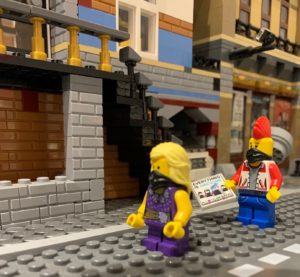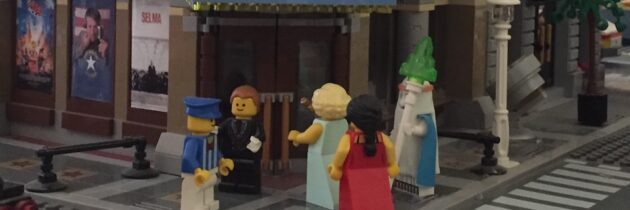On Watching “Chernobyl” Post-Covid
The five-part miniseries Chernobyl came out in spring 2019, and I didn’t watch it then. I had canceled my cable in October 2016 due to a dispute with my cable provider and only resubscribed in December 2019 because the building we moved into had a bulk-rate agreement with Spectrum. (One advantage of living in a large building.) In the June 4, 2019 issue of The New Yorker I read a highly critical review of the series by Masha Gessen, who grew up in the Soviet Union. Gessen lauded Chernobyl for its authentic period detail but argued that the changes that the filmmakers made to create a more audience-friendly show — one heightening conflict that would have remained unspoken and presenting a singular “hero” in the form of an attractive woman scientist who was a composite of many Soviet scientists — made the show as much of a lie as the Soviet propaganda surrounding the deadly nuclear accident. Reading the review did not make me want to go out of my way to see Chernobyl.

While we can’t go to the movies, we can see shows at home.
A combination of pandemic lockdown with less to do, and my enjoyment of the other historical dramas A French Village and The Weissensee Saga, led me to watch Chernobyl last week. Seeing it in 2021 rather than 2019 gave me a very different perspective on its portrayal of the Soviet bureaucracy than what the filmmakers intended, and it sheds light on the four-year nightmare that we in the United States have endured.
At no point in their essay did Gessen accuse the filmmakers of either exaggerating or softpedaling the portrayal of the Soviet regime. Chernobyl chronicles Soviet efforts to cover up the accident, including a proposal to trap the residents of Pripyat and the surrounding area in a deadly radioactive zone with telephone connections, roads, and bridges cut off. It also addresses the scapegoating of three rather unsympathetic managers who took the fall for all the corners cut in the construction and operation of the nuclear power plant.
That said, enduring the past year of the Trump administration’s management of the Covid-19 pandemic — one of the worst responses in the world — puts the Soviet management of the Chernobyl explosion into perspective. We can no longer say, “Soviets bad, Americans good.”
The miniseries does show what Mikhail Gorbachev and his regime did right. They did not follow the elderly Party apparatchik’s advice to leave the residents in the contaminated zone. Within 48 hours, they evacuated the people of Pripyat and the surrounding towns and were sometimes brutal in doing so. In one scene, a soldier shoots the cow of an elderly woman who refuses to leave, and later on, more soldiers kill abandoned, radioactive pets. They spared no expense in finding ways to bury the exposed plant and preventing its melting core from contaminating the water supply of Kiev (now Kyiv, Ukraine) and much of the rest of Ukraine and Belarus. Eventually and through much pressure on the part of scientists, they corrected a key design flaw that led to the deadly accident. They honored the sacrifice of plant workers, firefighters, helicopter pilots, divers, miners, and those who removed radioactive materials from the plant’s roof so it could be sealed in a sarcophagus. The last group, nearly 4,000 of them, stepped in when the radioactivity rendered robots useless, and they could only work for 90 seconds. We see the patriotism and community spirit of the Soviet people, the same characteristics that this long-suffering people displayed during the Second World War in resisting the Nazi invasion and bringing the war to an end.

Six studs apart and wearing a mask.
That sacrifice for others was the first thing that stood out to me when watching the miniseries post-Covid. All we have asked of our fellow Americans is that they wear a piece of cloth over their face, but it seems to be too much for many of them. So much so that a not-inconsiderable segment of the population has threatened to kidnap and execute public officials or conduct anti-mask protests inside grocery stores where they shout and spit in the faces of their vulnerable neighbors. In fact, the Centers for Disease Control had to change their campaign from “my mask protects you; your mask protects me” to the less accurate “masks protect the wearer” because people were too selfish to protect anyone but themselves.
The second thing that stood out for me was the “duty of care” of government officials. In fact, Gorbachev was unusual among Soviet leaders in that way. He listened to his scientists, and the Party underling tasked with disaster management, Boris Shcherbina, was surprisingly thoughtful, open-minded, and competent.
A system of government, though, should not have to depend on the good will of individual leaders, nor should its people be endangered by the bad will of one individual. This is where the United States has failed over the past four years, and most notably in 2020. The “duty of care” turned out to be entirely lacking under Donald J. Trump. His public denial of the dangers of Covid-19 — at the same time that he told journalist Robert Woodward that it would kill hundreds of thousands of people, and at the same time that others with access to this intelligence were adjusting their stock portfolios to take advantage of the coming crisis — is reminiscent of the elderly local apparatchik who wanted to condemn the population of Pripyat to a gruesome death. He promoted quack cures from which his friends and allies profited. Some of these, like injecting bleach and ingesting poisonous substances, further endangered all who listened to him. There is mounting evidence that his lack of caring resulted from the initial ravages of the virus primarily affecting Black and brown people and residents of liberal cities and states.
In many ways, the virus is like radiation. You cannot see it. You cannot predict, except in extreme cases, who will die, who will recover, and whose life will be shortened or limited by long-term effects. Having seen Chernobyl in the midst of the pandemic made me connect with this miniseries in a way I would not have if I’d seen it when it first came out. It has also made me more determined to support both political reforms and consequences so that one man doesn’t renounce his duty to care for his people, leading to the horrific deaths of hundreds of thousands and the almost end of democracy itself.







I haven’t seen this, though I have heard how good it was. Glad you found it compelling, Lyn!